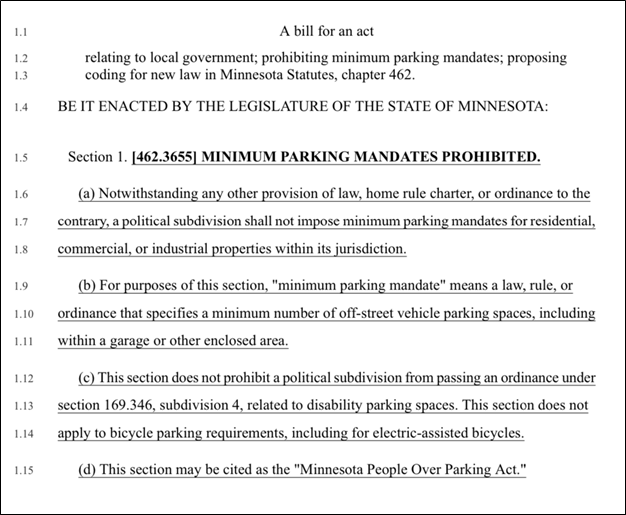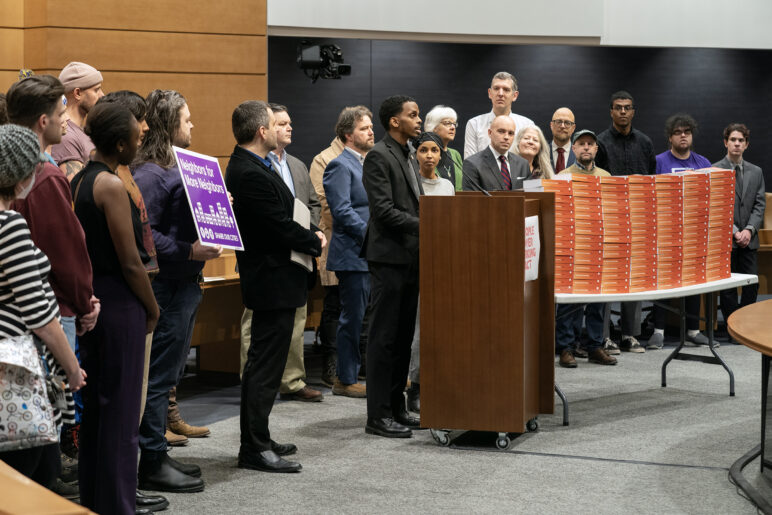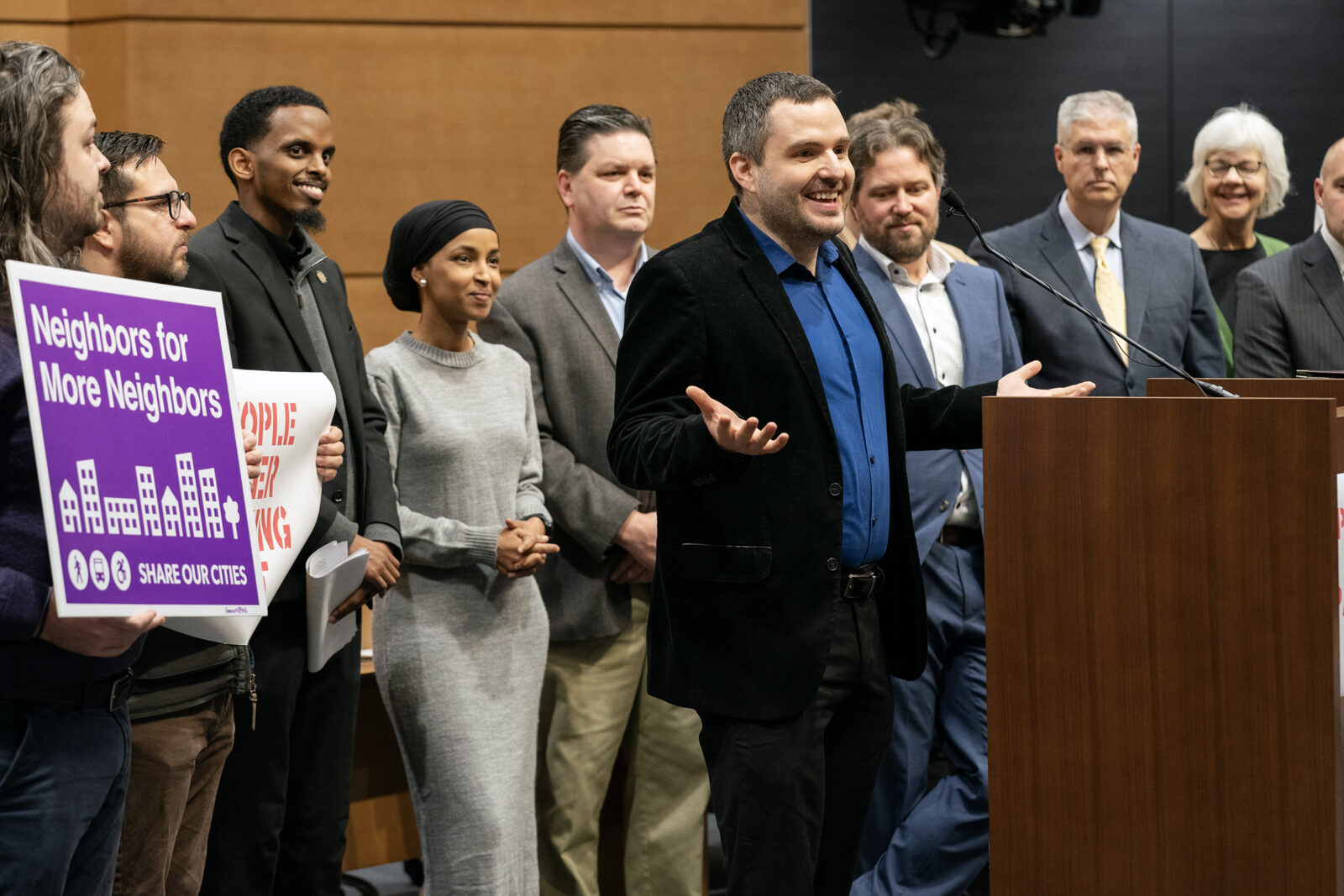Find audio versions of Sightline articles on any of your favorite podcast platforms, including Spotify, Google, and Apple.
If Minnesota becomes the first state to end parking minimums, it’ll be thanks in large part to Chris Meyer.
Since he read the High Cost of Free Parking over a decade ago, Chris Meyer has been on a mission to liberate new homes and businesses from costly parking mandates—rules that dictate every building have a pre-determined minimum number of parking stalls.
From writing about parking minimums in his college newspaper, the Minnesota Daily, to handing out copies of Shoup’s book to Minneapolis City Council members, Chris has been sowing the seeds of reform wherever he is. “I’ve never met anyone that is as excited about parking than Chris Meyer,” US Representative Ilhan Omar said at the bill’s press conference, recounting the years she worked at city hall leading up to Minneapolis’s 2015 transit-related parking reform. Meyer went on to serve on the Minneapolis Planning Commission, which added the City of Lakes to the list of cities who fully repealed parking minimums in 2021.
Now, as legislative assistant to state Senator Omar Fateh, he is behind an ambitious new bill in Minnesota that would prohibit parking mandates across the state: All cities, all uses. Sightline called him up to learn more.

Catie Gould: How did the People over Parking Act originate?
Chris Meyer: I suggested it to my boss [Senator Fateh]. He was persuaded it was a good idea, because he cares a lot about housing affordability and climate action. This was a good way to take on both of those issues.

CG: You took a pretty bold stance. No minimums at all, no exceptions. What is your thinking around the politics of that versus incremental reform—like no minimums for certain uses or around transit? Those approaches seem more common.
CM: A more modest version would probably have an easier time passing but—first, the reception has been pretty good! The Star Tribune, the big paper here, their editorial board wrote an opinion piece in support of the bill. And a GOP legislator just came out in support. Opposition has been more muted than anticipated. But even if it hadn’t been, I felt like it was important to make the case for the full-fledged elimination of parking minimums, across the board.
Parking minimums are only ever bad or pointless.

I know a lot of other places started with removing them around transit stations. That’s how Minneapolis did it as well in 2015. But I feel the case against parking minimums is just as strong regardless of whether it’s a small-town, suburb, or a big city, and regardless of how car dependent the place might be. I’m from a small town of 6,000 people. We have a nice downtown main street. It would be illegal to build as it is under parking minimums. There would be too much parking required between buildings for it to be a nice, walkable, main street. In small towns it makes sense to get rid of these. It makes sense to get rid of them everywhere.
Parking minimums are only ever bad or pointless. If you set requirements low enough that they would be building it anyway, it’s a pointless requirement. If you set it above what they would be building otherwise, then you’re forcing unnecessary parking to be built. So regardless of the situation, we felt that it was important to communicate that these parking minimums are bad policy everywhere.
CG: Has statewide parking reform ever been attempted in Minnesota before?
CM: Not to my knowledge. If it has, no one knows about it because it seems like everyone is being introduced to the idea for the first time.
CG: Will this bill have an impact on people’s everyday lives?
CM: It’ll be a gradual one. Minneapolis, St. Paul, and now Duluth also eliminated parking minimums as well. As we did that there wasn’t any dramatic change overnight. But gradually it did reduce housing costs pretty substantially. There was national coverage of how Minneapolis was keeping inflation low because rents were staying low. That was largely because of reforms like this, that allowed more housing to be built.
CG: Why does the state need to be involved? Parking issues are incredibly local.
CM: Cities have only ever had the right or ability to implement zoning policies because the state delegated that to them in the 1920s. And from the start, there have always been parameters around it, and they have adjusted those parameters over time. So you can’t, for example, implement racist segregation zoning. We believe it’s important to adjust the parameters to account for the housing crisis and the climate crisis, which are two of the biggest crises of our time.
CG: How are you talking about this differently with your Republican vs. Democratic colleagues?
CM: So, my boss is a member of the Democratic Socialists of America. He’s the polar opposite of some of the other legislators who are interested in this. And he comes at it from the perspective of caring about climate action and housing affordability. But other people who care about free markets and property rights and freedom are supporting as well. So there’s a very diverse ideological coalition who wants to see this happen.
CG: How do you respond to concerns that people still drive, they still own cars, and therefore they need parking?
CM: I will nod in agreement when they say that. Just let them decide how much parking they need.
CG: I was impressed by the number of organizations that were on stage at the press conference. How long have you all been talking about a policy like this?
CM: A lot of the main players involved were also previously involved in the efforts in 2015 [eliminating parking mandates around transit in Minneapolis]. They’ve been having discussions on how to make things more affordable, less car-dependent, and reduce carbon pollution for quite a while. So organizations like the Sierra Club and SEIU already understood the issue pretty well.

CG: You’ve been a part of multiple parking reforms, at the city and now at the state level. Do you have any advice?
CM: My advice for policymakers is to be ambitious. There are a lot of policymakers who understand that this is good policy but are worried about the politics. The politics won’t be that bad—that was the experience we had in Minneapolis. I would also advise people to start out with full elimination. If you need to compromise from there to get something that can pass, fine. But you should still express that parking minimums are bad policy across the board and should be fully eliminated.
“My advice for policymakers is to be ambitious…. to start out with full elimination.”

One of the goals of the Parking Reform Network is to get legislation like this at least introduced in every state. Even if it can’t pass, find someone to put the idea out there. Part of the function of that is not just enacting the legislation itself but getting the conversation started. We’ve already seen so much of that.
One organization opposed to the bill said, “Parking minimums aren’t arbitrary. They are the result of studies and engagement.” After some extensive conversations, they have acknowledged they are, in fact, arbitrary. Now they’re like, “So what if we make them not arbitrary?” Well, they’re intrinsically arbitrary. You can refine them better, I suppose, but it’s always going to be what the demand is for a point in time. You don’t have the money to constantly do these studies to adjust for every situation. The people who are best to do that, figure out what they need, are the builders themselves.
Even if this bill fails completely, it has started a lot of conversations that are going to lead to reform on the city level. That’s not good enough. There are some 800 cities in Minnesota. It would take forever. But it’s still moving the conversation forward. Not just minimums, either; we’re having productive conversations about things like parking benefit districts and sharing arrangements, and better using technology like apps that help you identify where the parking is.
This transcript was edited for brevity and clarity.


